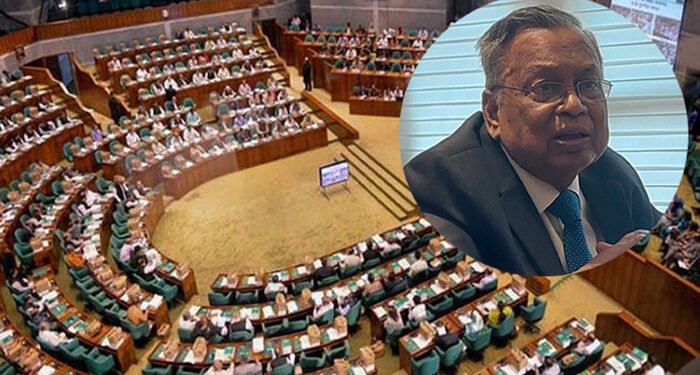A budget with an outlay of Tk 7.97 trillion has been passed for the new fiscal year starting Jul 1.
The parliamentary session presided over by Speaker Shirin Sharmin Chaudhury started at 11am on Sunday. The budget for the upcoming fiscal year was passed by voice vote.
The budget will take effect from Monday, the first day of the 2024-25 fiscal year after it receives the president’s approval.
This is the first budget passed by the Awami League government after it won a fourth consecutive term in power during the 12th national parliamentary elections. It is also the first budget for Finance Minister AH Mahmood Ali.
It is also the 53rd budget of Bangladesh and the 25th by a government led by the Awami League.
On Jun 6, the finance minister presented the budget proposal to parliament under the title March Towards Smart Bangladesh Following the Path of Sustainable Development. The budget was passed on Sunday after 11 days of discussion in parliament.
The budget for the upcoming fiscal year is about Tk 360 billion higher than the budget for the current fiscal year. The growth target was set at 6.75 percent, while the inflation target was pegged at 6.5 percent.
The size of the Annual Development Programme for the upcoming year is Tk 2.65 trillion.
Bangladesh aims to raise Tk 5.41 trillion in revenue for this budget. The National Board of Revenue has been tasked with collecting Tk 4.80 trillion in tax revenue. Of this, the NBR has to raise nearly Tk 1.83 trillion from VAT and another Tk 1.76 trillion from income tax and corporate tax.
The finance minister plans to collect another Tk 491.46 billion from import duties, Tk 642.78 billion from supplementary duties, Tk 700 million from export duties, Tk 58.05 billion from excise duties and Tk 19.80 billion from other taxes and duties.
Bangladesh hopes to raise another Tk 44 billion from foreign grants.
The difference between spending and revenue leaves a deficit of Tk 2.56 trillion, which is 4.6 percent of the total GDP.
Bangladesh hopes to meet the deficit by borrowing Tk 1.27 trillion from abroad and nearly Tk 1.61 trillion from domestic sources.
Within the domestic sector, a record of about Tk 1.38 trillion is being sought from banks, another Tk 154 billion from savings certificates, and Tk 80 billion from other sectors.

























